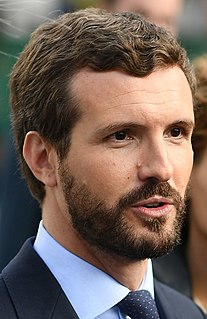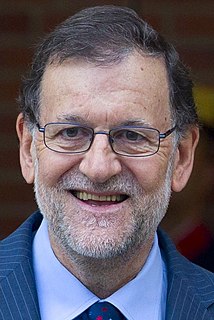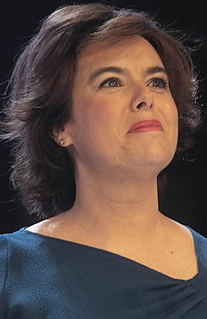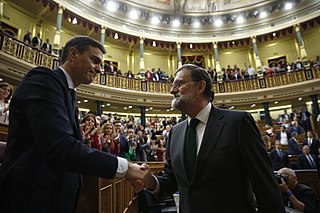
The People's Party is a conservative, liberal-conservative, Christian-democratic political party in Spain.

Mariano Rajoy Brey is a Spanish politician who served as Prime Minister of Spain from 2011 to 2018, when a vote of no confidence ousted his government. On 5 June 2018, he announced his resignation as People's Party leader.
A grand coalition is an arrangement in a multi-party parliamentary system in which the two largest political parties of opposing political ideologies unite in a coalition government. The term is most commonly used in countries where there are two dominant parties with different ideological orientations, and a number of smaller parties that have passed the electoral threshold to secure representation in the parliament. The two large parties will each try to secure enough seats in any election to have a majority government alone, and if this fails each will attempt to form a coalition with smaller parties that have a similar ideological orientation. Because the two large parties will tend to differ on major ideological issues, and portray themselves as rivals, or even sometimes enemies, they will usually find it more difficult to agree on a common direction for a combined government with each other than with smaller parties.

The Leader of the Opposition is an unofficial, mostly conventional and honorary title frequently held by the leader of the largest party in the Congress of Deputies—the lower house of the Spanish parliament, the Cortes Generales—not within the government. He/she is usually the person who is expected to lead that party into the next general election.

Law 57/2007 That recognises and broadens the rights and establishes measures in favour of those who suffered persecution or violence during the Civil War and the Dictatorship, commonly known as Historical Memory Law, is a Spanish law passed by the Congress of Deputies on 31 October 2007. It was based on a bill proposed by the Spanish Socialist Workers' Party government of Prime Minister José Luis Rodríguez Zapatero. The Historical Memory Law principally recognizes the victims on both sides of the Spanish Civil War, gives rights to the victims and the descendants of victims of the Civil War and the subsequent dictatorship of General Francisco Franco, and formally condemns the Franco Regime. The conservative Popular Party and the Republican Left of Catalonia (ERC) both voted against passage of the law but for different reasons. For its no vote the Popular Party accused the Socialist Party government of weakening the political consensus of the transition to democracy and "using the Civil War as an argument for political propaganda", while the Republican Left of Catalonia rejected the law on the basis it did not go far enough.

Holy See–Spain relations are foreign relations between the Holy See and Spain. Both countries established diplomatic relations in 1480. This is the oldest permanent diplomatic mission in history. The Holy See has a nunciature in Madrid. Spain has an embassy in Rome.

The President of the Regional Government of Galicia, is the head of government of Galicia. The president leads the executive branch of the regional government.

The 2016 Spanish general election was held on Sunday, 26 June 2016, to elect the 12th Cortes Generales of the Kingdom of Spain. All 350 seats in the Congress of Deputies were up for election, as well as 208 of 266 seats in the Senate.

The 2015 Spanish general election was held on Sunday, 20 December 2015, to elect the 11th Cortes Generales of the Kingdom of Spain. All 350 seats in the Congress of Deputies were up for election, as well as 208 of 266 seats in the Senate. At exactly 4 years and one month since the previous general election, this remains the longest timespan between two general elections since the Spanish transition to democracy, and the only time in Spain a general election has been held on the latest possible date allowed under law.

María Soraya Sáenz de Santamaría Antón is a Spanish politician of the People's Party who served as Deputy Prime Minister of Spain and Minister of the Presidency from 2011 to 2018. She was member of the Congress of Deputies representing Madrid from 2004 until 2018.

Jaime Ignacio González González is a Spanish politician and member of the Partido Popular. González served as the President of the Community of Madrid, one of the seventeen autonomous communities of Spain, from 26 September 2012 to June 2015.

Ana María Pastor Julián is a Spanish doctor and politician for the People's Party who served as President of the Congress of Deputies from 19 July 2016 to 20 May 2019. Previously she was Minister of Health from 2002 to 2004 and Minister of Public Works from 2011 to 2016. Since 20 May 2019 is the Third Vice President of the Congress of Deputies.

Attempts to form a government in Spain, and related events, followed the inconclusive Spanish general election of 20 December 2015, which failed to deliver an overall majority for any political party. As a result, the previous Cabinet headed by Mariano Rajoy assumed caretaker functions. According to Article 99.5 of the Spanish Constitution:
If within a period of two months from the first investiture vote no candidate has obtained the confidence of Congress, the King shall dissolve both chambers and call a new election, with the endorsement of the President of the Congress.

A motion of no confidence in the Spanish government of Mariano Rajoy was held between 31 May and 1 June 2018. The motion was registered by the Spanish Socialist Workers' Party (PSOE) on 25 May after the ruling People's Party (PP) was found to have profited from the illegal kickbacks-for-contracts scheme of the Gürtel case. The motion was successful and resulted in the downfall of Mariano Rajoy's government and in PSOE leader Pedro Sánchez becoming new Prime Minister of Spain. Rajoy announced on 5 June 2018 his resignation as PP leader after having led the party for 14 years.

The 2012 PP congress—officially the 17th PP National Congress—was held between 21 June 2008. Mariano Rajoy was elected for a third term in office with 97.6% of the delegate vote.

Adriana Lastra is a Spanish politician member of the Spanish Socialist Workers' Party that currently serves as the Spokesperson of the Socialist Group in the Congress of Deputies. She is also the Deputy Secretary-General of the PSOE.

Mariano Rajoy formed the Rajoy I Government on 22 December 2011 after being nominated by King Juan Carlos I to form a government as a result of the People's Party (PP)'s victory at the 2011 general election. It was the government of Spain from 22 December 2011 to 4 November 2016, a total of 1,779 days, or 4 years, 10 months and 13 days. Rajoy was elected Prime Minister by the Congress of Deputies on 20 December and was sworn into office on 21 December. Rajoy's first cabinet was composed mainly by members of the PP, as well as a number of independents. It succeeded the second Zapatero government.

Mariano Rajoy formed the Rajoy II Government on 4 November 2016 after being nominated by King Felipe VI to form a government for a second term in office as a result of the People's Party (PP)'s victory at the 2016 general election. It was the government of Spain from 4 November 2016 to 7 June 2018, a total of 580 days, or 1 year, 7 months and 3 days. Rajoy was elected Prime Minister by the Congress of Deputies on 29 October and was sworn into office on 31 October. Rajoy's second government was composed mainly by members of the PP, as well as a number of independents. It succeeded the first Rajoy government.
This page is based on this
Wikipedia article Text is available under the
CC BY-SA 4.0 license; additional terms may apply.
Images, videos and audio are available under their respective licenses.















